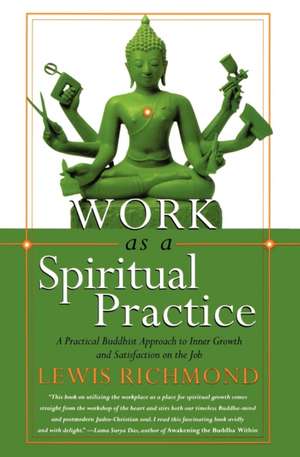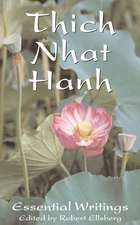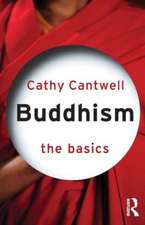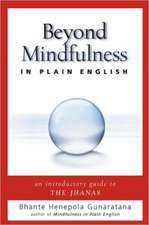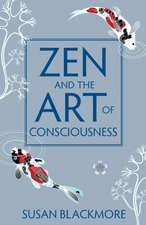Work as a Spiritual Practice: A Practical Buddhist Approach to Inner Growth and Satisfaction on the Job
Autor Lewis Richmonden Limba Engleză Paperback – 31 ian 2000
Most people associate Buddhism with developing calmness, kindness, and compassion through meditation. Lewis Richmond's Work as a Spiritual Practice shows us another aspect of Buddhism: the active, engaged side that allows us to find creativity, inspiration, and accomplishment in our work lives. With over forty spiritual exercises that can be practiced in the middle of a busy workday, Work as a Spiritual Practice is based on the principle that "regardless of your rank and title at work, you are always the chief executive of your inner life."
Drawn from the author's diverse professional experience--as a Buddhist meditation teacher, business executive, musician, and high-tech entrepreneur--Work as a Spiritual Practice addresses a wide variety of on-the-job problems. Here you'll learn how to:
perform spiritual practices while commuting to and from work
meditate while sitting, walking, or standing--a minute at a time
understand ambition, money, and power from a spiritual perspective
Work as a Spiritual Practice is an essential guide for anyone who wants to bring his or her spiritual life and work life together.
Preț: 106.86 lei
Nou
20.45€ • 21.27$ • 16.88£
Carte disponibilă
Livrare economică 24 martie-07 aprilie
Specificații
ISBN-10: 0767902335
Pagini: 272
Dimensiuni: 136 x 208 x 19 mm
Greutate: 0.24 kg
Editura: BROADWAY BOOKS
Recenzii
"This book on utilizing the workplace as a place for spiritual growth comes straight from the workshop of the heart and stirs both our timeless Buddha-mind and postmodern Judeo-Christian soul. I read this fascinating book avidly and with delight."
--Lama Surya Das, author of Awakening the Buddha Within
"This deceptively simple, immensely practical book is as useful as a fine shoe. Like good footwear it is made to be used, built to last, and has the kind of fine style that derives from a perfect matching of form to function. I have become so attached to it that leaving the house without one or the other of Lewis's practices in mind is like venturing into the wilderness without my boots."
--Peter Coyote, movie actor and author of Sleeping Where I Fall
An "exquisite guide to finding happiness and health in one's work.
--NAPRA ReView
"This timely book is the one the workaday world has been waiting for. Lewis Richmond is the ideal person to explore the application of Buddhist practices to the workplace. [This is] an accessible, personal, witty, and poetic book that will be helpful, even transformative, for anyone who works for a living."
--Sylvia Boorstein, author of It's Easier Than You Think: The Buddhist Way to Happiness
Notă biografică
Extras
To find joy in your work is the greatest thing for a human being.
--Harry Roberts: agronomist, cowboy, woodworker, welder, boxer, gun-sight maker, spiritual teacher in the Native American tradition, and Ginger Rogers's dance partner
"So. What do you do?"
How many times have you been asked that question and answered, without thinking, "I'm a lawyer," or "I'm an aerobics instructor," or "I'm a musician." But beyond small talk, that question suggests a deeper inquiry. What, indeed, do you DO, here on this earth, here in your life? What is your work? What is your passion? What is your aspiration, your dream, your calling? Do you find joy in your work? Have you given up hoping that joy is something you might expect from work? Or do you love your work so much that you have no time to enjoy anything else? Why do you have the job you do? Is it just a way to make ends meet, or is it something more? What is the relationship between your inner self and your outer, public life on the job?
This book seeks to guide you on a path of spiritual discovery about the work that you do and offer practical ways to make that work more connected to your inner life. I don't know if what you learn will improve your job in a conventional sense. Who knows, it might make you upset enough to quit your job and find a better one! But it may help you in a spiritual sense.
I am a Buddhist, which means I am also a realist. In our society, work is not expected to be spiritually satisfying. For the most part, our jobs are designed to make someone somewhere a profit. Listen to what one recent writer to Ann Landers had to say about his job:
Why should anybody give their best effort on the job? No one cares about the worker anymore. Growing up in the '60s, we were taught that giving your best would always ensure your employment. That's baloney. It's all a matter of random chance whether or not your job continues. I've been laid off twice through no fault of my own.
Perhaps someday work will evolve to the point where it is once again integrated with family, community, spirituality, and nature, as it was in preindustrial times. Until then, the Buddhist worldview begins with today, just as it is, for good and ill--today's job, today's life, today's "you."
What this book offers are ways to help you become more aware, more awake, and more engaged in your work life. Even the worst job has its compensations, and even the greatest job has its demerits. This book can't make your job perfect, but it may make it more workable. The reason I think so is because, spiritually speaking, you are in charge. Your employer may dictate every aspect of your work life, but no matter what kind of job you do, you are the boss of your inner life.
Most people think of Buddhists as people who meditate. That's partly true. I spent many years living in a Buddhist retreat center, where I did indeed spend many hours each day in silent meditation. But Buddhism has its active side too, and some of its practices are adaptable to a busy, engaged life. Many of them aren't meditation in the usual sense of the word but rather exercises in awareness and focus. Some address various emotional states, such as anger, fear, frustration, and boredom. Others work on how we interact with people, or on the speed and pace of our activity. All of them are designed to awaken the fundamental spiritual inquiry: Who am I? What am I doing here? How can I fulfill my life's potential? These practices are all based on the conviction that we have the resources we need to make that inquiry come to life, and that the circumstances of our daily life can be the raw materials in that effort.
One thing's for sure: You don't have to be a Buddhist to benefit from these practices. During my career as a meditation teacher, I have taught and practiced with Catholic monks, rabbis, Protestant ministers, Muslims, nature worshipers, agnostics, atheists--people of many religious and nonreligious persuasions, many of whom, I'm sure, didn't think of themselves as Buddhists. But they all benefited from Buddhist practices.
Work Life and Spiritual Life
Have you ever heard the saying "It's not my wife and it's not my life"? It's something to say when things go badly at work. Well, your job may not be your wife (or husband), but it is your life, or a big part of it. Studies show that the average American is working 150 more hours a year than in 1910--a sobering thought! When we disassociate ourselves from our work by saying, in effect, "This is not the part of my life that really counts, I just do this for a living," we close ourselves off from what my teacher Harry Roberts used to say was the greatest thing for a human being--to find joy in our work.
How do you feel about your job? Do you love your work but find that it takes up so much of your time that it really is your whole life? Or, is your work dull and drab, but you don't mind because you are going to night school to prepare for a different, more satisfying career? Perhaps you work in the helping professions or in education, and it is not your boss but your clients (or patients, or students, or parents) who drive you to distraction.
Regardless of your situation, there are certain characteristics of work that are universal. Unless you work at home, you travel to work. When you get there, you perform some task, such as computer programming, carpentry, or management, for which you are financially rewarded. You interact with other people in an environment where power is unequally shared. Your job performance is measured in some way. You compete with others for rewards. You can quit your job. You can lose your job. And you have (we hope) a life outside your job.
Let's contrast this description of life on the job with the life of the spirit. In our spiritual life, we are not in competition with anyone else for spiritual rewards. How well or badly we do is beside the point. We honor and appreciate all people (including ourselves!) for their intrinsic humanity. We care for others, we share and are generous, we forgive. The world of the spirit is not a matter of bonuses, promotions, or awards. Advancement is not the point. We are already whole and complete just as we are.
So it would seem that spiritual life is close to the opposite of work life! But suppose we stop for a moment and ask ourselves why the modern workplace is the way it is. Is it because evil tyrants created the modern workplace to torment us? Or is it because over the last few hundred years people have cooperated to create a world in which we live better, longer, and happier, and can provide a more secure future for our children? We are all collectively responsible for the way work is today, and to whatever extent that situation is far from perfect, we must keep exploring, experimenting, and trying. It may be that over time the nature of work will undergo some grand transformation. Some social theorists think that kind of change is already under way. I think so too, and in chapter 19, "The Transformation of Work," I explore some of those trends. But let's not wait for that great moment. Today there is something we can do. Today we can make a change. Today it is possible to make a difference.
As you begin exploring this book--and you need not read it from front to back; it is designed to be browsed--I ask you to make only one commitment, and that is to trust yourself. Trust your own instincts, your intuition, your judgment. The knowledge you need to change your work life for the better is already within you. Set aside, for now, the notion that on the job you work for somebody else. In your spiritual life, you are self-employed. You work for yourself. No one need know about this inner job. It can be your secret. Whatever efforts you make will be outside the realm of success or failure. I don't know what will happen if you try the practices in this book, but I am sure of one thing: Something will happen.
The reason I am so sure is that something is always happening. The world is full of spiritual opportunity. The trick is to be alert enough to notice it. That is the real work, and the joy of work, and if we catch on to that trick, it doesn't matter in the short run what our day job is. In the end, if we are kind to ourselves, our efforts will be fruitful.
The Koan of Everyday Life
But what kind of fruit will it be? A raise, a better job, a happier work and home life? Perhaps, but not necessarily. Spiritual practice is more about questions than answers, more about searching than finding, more about effort than accomplishment. In one school of Buddhism, those who practice ponder spiritual questions called ko-ans. There are hundreds of memorable stories, usually taken from the lives of ancient Buddhist teachers, that are used as koans. Some of them have even become part of popular culture. For instance, the question "What is the sound of one hand clapping?" was featured in an episode of The Simpsons television show.
In addition to these prefabricated questions, there is another kind of koan, called the koan of everyday life. Human life itself, the mystery of being thrust into the world by birth and swept out of it by death, is an imponderable puzzle, one that we can try to ignore but cannot escape. So much of what passes for "ordinary" life is, when seen through different eyes, not ordinary at all, but full of potential for spiritual learning. To practice the koan of everyday life means to confront every situation as though it were a profound spiritual question. In that sense, every koan story is a specific instance of the koan of everyday life.
One such koan story goes like this:
A monk asked his teacher, "What is the Buddha?" and the teacher answered, "The cypress tree in the garden."
What does it mean? What does a cypress tree have to do with Buddha, that is, our awakened self? Let's imagine this cypress tree, spreading over the path in the monastery garden. What could be more ordinary, or familiar, than the aged tree that each monk passed every day for the whole of his life? In that sense, the cypress tree means the most familiar thing. What familiar thing do you pass? Is it your kitchen table? Your car? Your good friend? Your spouse or children? Your coworkers? The copy machine in the office corner?
This book is based on the premise that our ordinary routine contains numerous treasures and the details of our workday, from the morning commute to the coffee break, the lunch hour, the afternoon meetings, the evening ride home, contain within them any number of gifts for our spirit, if only we would allow ourselves to receive them.
Here is a true story to illustrate this.
A woman named Julie managed a customer service department in an insurance company. Because of budget cuts, in addition to her managerial responsibilities, she had to spend a couple of hours each day taking overflow calls. The worst part of her job, she told me, was the unpredictable ringing of the telephone. As the week went on, she found herself resenting that sound more and more. She would try to turn the volume down, but if it got too soft she couldn't hear it in time, which was even worse.
One day, without really thinking about it, she found herself pushing the button to lower the volume on the phone in rhythm with the ringing itself and suddenly thought, "I'm the one doing the ringing." From then on, every time the ringing got on her nerves, she would raise and lower the volume of the ringing in time with the ringing, as though her finger were making the phone ring.
"It's a silly thing," she said, "but it made me feel in charge again."
In this case the koan of everyday life took the form of a ringing phone. Anyone who works in an office understands only too well how large that ringing phone can loom. We all have to deal with it, none of us likes it, and yet that ringing phone can be a wake-up call to our inner life. In having to confront the irritation of the ringing phone, we also confront the fundamentals of who we are and want to be. The ringing phone stands for everything in our life that we cannot control, everything that makes our life unpredictable, confusing, and difficult. For those of us who think of spiritual life as something to be found in a church, a retreat center, or a walk by the seashore, the ringing phone is the last thing we wish to hear.
But for those who are willing to see a spiritual opportunity in the ordinariness of everyday circumstance, the ringing phone is no less profound an encounter than the cypress tree in the garden.
What makes the difference is the resource of spiritual practice, which is a way to transform the mundane into the sacred, the ordinary into the profound. In Julie's case, her instinct to embrace the ringing not as something outside but as something inside was an example of a practice we will be exploring later as "Seeing and Hearing with the Heart." She was hearing that phone not with her mundane ear, but with a more spiritual organ.
To understand that a sound is not something outside ourselves, but something within, is a shift of consciousness that can lead to a different understanding of who we are for others and who others are for us. From that insight comes generosity, compassion, and wisdom.
It may not seem like such a great accomplishment to tap our fingers in time with the ringing of a phone. But spiritual learning is nothing other than the accumulation, over time, of such small, modest awakenings. Eventually this can lead to a fundamental shift of perspective, a change in the sense of who "I" am and what "the world" is.
It is said that the monk, on hearing the words the cypress tree in the garden, experienced such a shift in perspective. In understanding such a story, it is important to realize how intimately that tree was a part of the monk's daily life, just as the ringing phone was a part of Julie's. The cypress tree in the garden was already in his heart. He passed it every day as he carried water to the kitchen, or firewood to the bathhouse, just as we might pass the office copier or the paper cup dispenser as we walk down the hall. That is why hearing the words the cypress tree in the garden caused his heart to open. Through spiritual practice, through concentrated attention over a long period of time, the tree was already growing within him.
The cypress tree in the garden can be anything, as long as we really see it and hear it, are open to it, and have an alert, caring, questioning mind.
This is the koan of everyday life. This is the potential of the workplace to be, for each of us, a spiritual place. This is the world seen with the eyes of awakening, a world in which everything we see and touch is offered to us as a gift.
Lift your eyes from this page, look up, look around you. Notice the first thing you see. What is it? A desk lamp? A window shade? A pencil? These humble objects are, indeed, capable of becoming your close spiritual friends.
Greet them as friends, because as you peruse this book, they will befriend as well as challenge you.
If nothing else, the next time the phone rings I hope that you will remember Julie, her tapping finger, the monk, and the cypress tree, and consider the possibility that the voice on the other end of the line might be someone other than the person who placed the call.
It might be you yourself.
Textul de pe ultima copertă
Most people associate Buddhism with developing calmness, kindness, and compassion through meditation. Lewis Richmond's Work as a Spiritual Practice shows us another aspect of Buddhism: the active, engaged side that allows us to find creativity, inspiration, and accomplishment in our work lives. With over forty spiritual exercises that can be practiced in the middle of a busy workday, Work as a Spiritual Practice is based on the principle that "regardless of your rank and title at work, you are always the chief executive of your inner life".
Drawn from the author's diverse professional experience -- as a Buddhist meditation teacher, business executive, musician, and high-tech entrepreneur -- Work as a Spiritual Practice addresses a wide variety of on-the-job problems. Here you'll learn how to:
-- perform spiritual practices while commuting to and from work
-- meditate while sitting, walking, or standing -- a minute at a time
-- understand ambition, money, and power from a spiritual perspective
Work as a Spiritual Practice is an essential guide for anyone who wants to bring his or her spiritual life and work life together.
